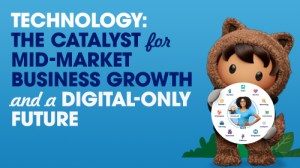Between the Small and Medium Businesses (SMBs) and the large Enterprise companies, lies the mid-market (MM) space. Based on their asset size, the number of employees, geographical presence, and scale of operations, these companies overshadow their SMB brethren but are yet to join the Enterprise league.
Understanding the mid-market dilemma
On their growth journey, MM companies aspire to find a sweet spot – where people, processes, and technology align, act, and grow cohesively. While these companies are open to onboarding good talent and technology, they also need to keep their costs down and make financially viable decisions. Hence, some unique dilemmas emerge before MM companies:
- How to build high-performing teams without increasing the cost per employee?
- How to streamline organisation-wide processes without deploying multiple solutions that work in silos?
- How to undertake digital transformation without heavy capex investments in infrastructure and software?
The answer to these dilemmas lies in technology that:
- supports the organisation with insights and intelligence to boost performance and productivity
- offers dedicated tools for sales, service, and marketing teams, built on an integrated platform
- comes with subscription pricing models that charge per use and offer plug-and-play options
MM companies have an aggressive growth agenda and can quickly outgrow point solutions. Hence, they need scalable, agile, and customisable solutions that can be a backbone for growth and help them make that leap into the enterprise segment. This will ensure that they can have it all – business continuity, growth and expansion, competitive differentiation, and market relevance.
Given how the pandemic has accelerated digital transformation for businesses across the world, this could be the perfect time for Indian MM companies to consider the role of technology as a complete game-changer and transform for a digital-only future.
The right technology solution can enhance the endeavours of mid-market companies by facilitating:
Quick lead conversion and smarter sales
Converted leads fuel business growth. Period.
For maximum lead conversion, sales teams at mid-market companies need to:
- capture customer data across all touchpoints – phone, app, website, physical store, or third-party data
- analyse the data to identify and focus on high-quality leads
- drive personalised and contextual interactions with potential leads
This requires a sales solution that offers:
- a consolidated, comprehensive view of customer data from across all touchpoints
- tools for analysing leads, predicting conversion rate, and forecasting sales revenue
- access to customer insights for conversations that turn into conversions
And a legacy CRM is no longer that solution!
Major channel partner for industrial electrical and power transmission products, Vashi Electricals makes for a great success story here. While the company distributes more than 40,000 products to 15,000 companies annually, there are around 200,000 potential customers that remain to be tapped. To unlock this growth potential, Vashi Electricals deployed a CRM platform that offered a 360-degree view of the entire sales process – from customer enquiry to collection. Salesforce Sales Cloud enabled the sales team to achieve end-to-end pipeline management, identify live opportunities and key prospects, and score leads for up-sell. As a result, the sales team became far more productive, and the opportunity closure rate went up by 10 per cent.
Delivering a seamless, omnichannel customer experience
Today, customers follow a dynamic, non-linear buyer journey. From a brand’s website to the social media page, and from its mobile app to a physical store – a customer could be using any channel, anytime for browsing, comparing, or buying a product or service. To win over these customers, MM companies must offer a seamless omnichannel customer experience – one that makes a customer’s interaction with your brand effortless!
To build a delightful omnichannel customer experience, service agents need to:
- have end-to-end visibility into the customer journey across channels
- offer faster, reliable query resolution across channels
This requires a customer service solution that offers:
- a unified view of customer interactions across channels
- support for customer self-service option
- AI-powered chatbots for seamless handoff to agents
GEP, for example, enables large enterprises to manage their global procurement and supply chains. The company’s flagship SaaS offering, GEP SMART™, is a business-critical tool and needs to be up and running 24/7. GEP’s global customer support team must ensure that they are available to resolve cases quickly and round-the-clock. To offer such high-quality, uninterrupted support implemented Salesforce Service Cloud, which boosts the customer support team’s productivity with a single view of the customer and also enables customers to self-serve on the Customer Success Portal. Even during COVID-19, as customer support teams worked from home and case volumes went up by 9%, GEP’s service team achieved a 5% improvement in SLAs, and case resolution time dropped by 23%.
Marketing automation for personalised engagement at scale
Marketing automation brings efficiency, transparency, and personalisation to marketing initiatives. This can prove advantageous for MM companies as they can:
- ramp up their marketing efforts without the need for an extensive marketing team
- tie marketing initiatives with sales targets
- easily engage with prospects across different channels
- identify marketing channels offering the highest engagement and best ROI
For this, MM companies need a marketing solution that:
- automates repetitive tasks such as social media posting and email marketing
- helps run targeted marketing campaigns that generate a steady flow of high-quality leads
- dynamically changes content for personalised marketing
- supports email A/B testing and SPAM analysis
- tracks ROI on marketing campaigns
A case in point is the NMIMS Global Access School for Continuing Education (NGA-SCE). This digital-first university runs more than 1000 campaigns at a time using Salesforce Pardot. With Pardot, NGA-SCE is able to engage prospects with the right message at the right time, and closely monitor key metrics around email performance. And high-quality leads from social media, web-to-lead forms, and affiliate programme marketing fill the sales pipeline, making it richer and more valuable.
As mid-market companies plan to leverage technology in key business areas, Salesforce Customer 360 can be their one-stop solution. The Customer 360 platform consolidates all your customer data – sales, service, and marketing – into a single source of customer truth. This allows cross-functional analysis of data and gives teams a holistic understanding of customer profiles. With tailored solutions for the MM segment across industries, Salesforce Customer 360 helps businesses grow, scale, and become future-ready.

























